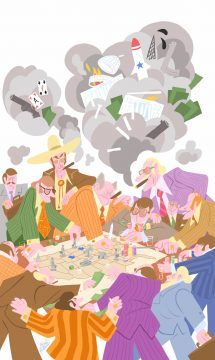Anand Giridharadas in The New York Times:
 It used to be called the New World. Now it’s run by a man who wants to make it great “again.”
It used to be called the New World. Now it’s run by a man who wants to make it great “again.”
Sometime between then and now, the writer Kurt Andersen argues in his essential, absorbing, infuriating, full-of-facts-you-didn’t-know, saxophonely written new book, America lost one of its “defining” traits: “openness to the new,” its gee-whiz tendency to “try the untried and explore the uncharted,” its “innovative, novelty-seeking, risk-taking attitudes,” its “new conceptions of freedom and fairness and self-government and national identity” — built, it must be said, atop tyrannies new and old.
Andersen traces this “cultural U-turn” to the 1970s. (Reading this book will disabuse you of any notion that hair was the biggest problem of that era.) In those years, Andersen writes, America swerved away from the new on two distinct but intersecting levels. In culture, it fell into a “mass nostalgia” that became a “cultural listlessness,” a slowing of the rate at which life looked, felt and sounded new — Americans from the 1950s and 1970s appearing as if from different planets, but Americans from the 2000s and today looking not all that dissimilar. Meanwhile, in political economy, America was hijacked by capital supremacists, who preached and enacted, as Andersen details with wallets-full of receipts, a return to a pre-New Deal order: “everybody for themselves, everything’s for sale, greed is good, the rich get richer, buyer beware, unfairness can’t be helped, nothing but thoughts and prayers for the losers.”
To begin with the conclusion of “Evil Geniuses,” Andersen, the author of several books and an accomplished magazine editor and radio host, argues that this double reversion threatens the endurance of the country he has long chronicled. America, he says, risks being “the first large modern society to go from fully developed to failing.” In an illustration of his gift for connection-making and framing, he suggests that what could save the country “is a transformative pivot almost as radical for us as the one China made” when it abandoned Communism for capitalism, while, Andersen notes for our benefit, more or less preserving the chassis of its political system.
More here.
